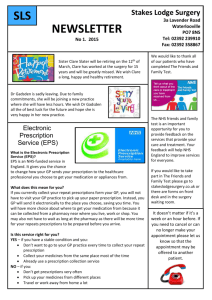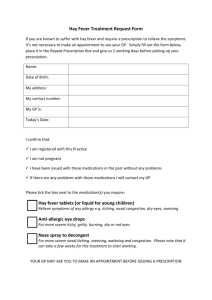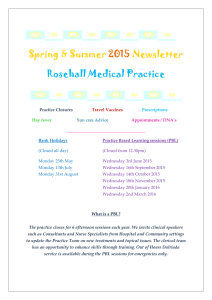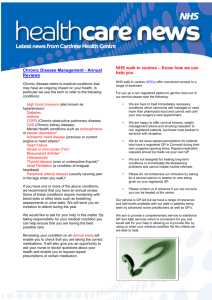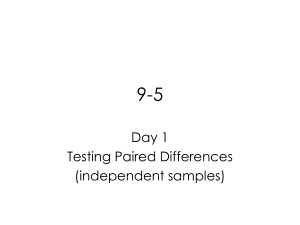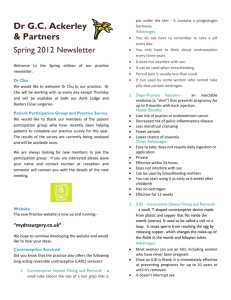Read our Newsletter - The Village Practice, Thornton
advertisement
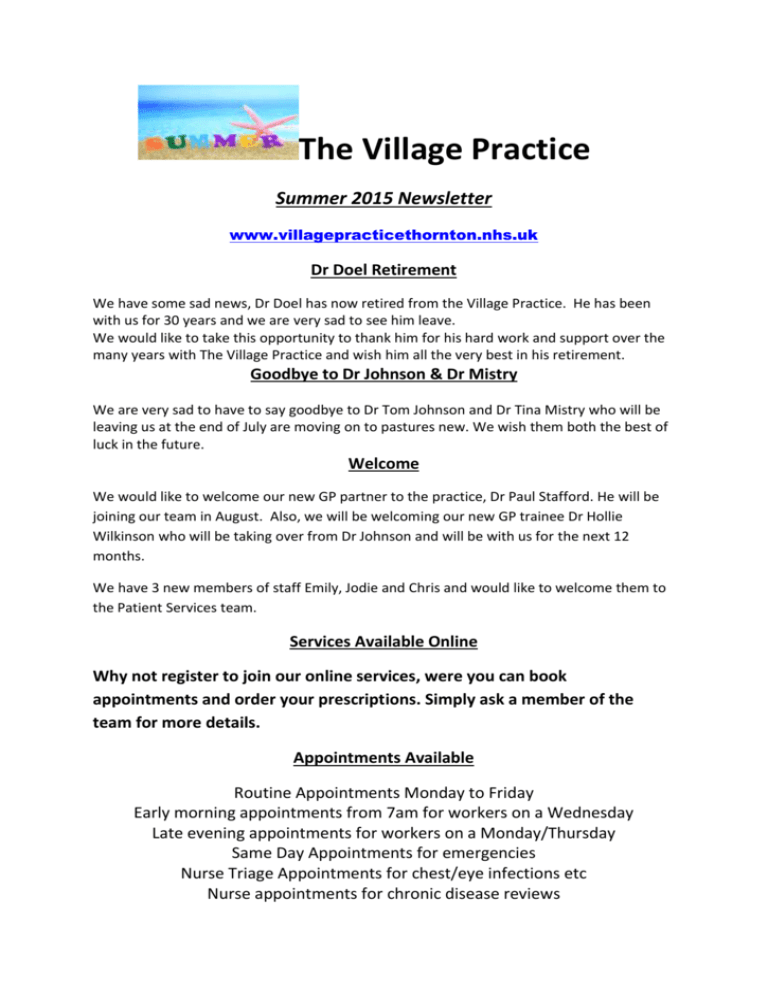
The Village Practice Summer 2015 Newsletter www.villagepracticethornton.nhs.uk Dr Doel Retirement We have some sad news, Dr Doel has now retired from the Village Practice. He has been with us for 30 years and we are very sad to see him leave. We would like to take this opportunity to thank him for his hard work and support over the many years with The Village Practice and wish him all the very best in his retirement. Goodbye to Dr Johnson & Dr Mistry We are very sad to have to say goodbye to Dr Tom Johnson and Dr Tina Mistry who will be leaving us at the end of July are moving on to pastures new. We wish them both the best of luck in the future. Welcome We would like to welcome our new GP partner to the practice, Dr Paul Stafford. He will be joining our team in August. Also, we will be welcoming our new GP trainee Dr Hollie Wilkinson who will be taking over from Dr Johnson and will be with us for the next 12 months. We have 3 new members of staff Emily, Jodie and Chris and would like to welcome them to the Patient Services team. Services Available Online Why not register to join our online services, were you can book appointments and order your prescriptions. Simply ask a member of the team for more details. Appointments Available Routine Appointments Monday to Friday Early morning appointments from 7am for workers on a Wednesday Late evening appointments for workers on a Monday/Thursday Same Day Appointments for emergencies Nurse Triage Appointments for chest/eye infections etc Nurse appointments for chronic disease reviews Electronic Prescription Service The Electronic Prescription Service (EPS) is an NHS service. It gives you the chance to change how your GP sends your prescription to the Pharmacy of your choice to get your medicines or appliances from. If you collect your repeat prescriptions from your GP, you will not have to visit your GP practice to pick up your paper prescription. Instead, your GP will send it electronically to the Pharmacy of our choice, saving you time. You will have more choice about where to get your medicines from because they can be collected from a pharmacy near to where you live, work or shop. You may not have to wait as long at the pharmacy as there will be time for your repeat prescriptions to be ready before you arrive. This started in January 2015. Patient Participation Group We still have vacancies available if patients would like to join our patient participation group. This involves patients being able to pass on their views with regards to how the practice works and how they think things could be improved. For any information please ask at reception how to participate. Sponsored 5K Run Congratulatoins to Adele, Judith, Tracey, Lisa, Emma & Emily who took part in the Trinity Hospice Colour Splash local 5km colour run on Saturday 25th July. The girls have raised nearly £300 – Well Done Girls!!! Bank Holiday Closing Times We will be closed ALL day on Monday 31st August 2015 and we will re-open again Tuesday 1st September normal opening hours. Please remember to order your prescriptions early so that you have your medications in time for this closure. When we are closed If you require urgent medical assistance which cannot wait until the surgery re-opens, please call 1-1-1. Calls to the NHS 111 service are free from both landlines and mobiles. If you have a life threatening medical emergency please dial 999. Helpful Tips for this Summer Insect Bites In the UK, insects that bite include midges, mosquitoes, fleas, bedbugs and, although not strictly insects, spiders, mites and ticks, which are arachnids. Insects that sting include bees, wasps and hornets. An insect bites you by making a hole in your skin to feed. Most insects sting as a defense by injecting venom into your skin. See your GP if you've been bitten or stung and there's a lot of swelling and blistering or if there's pus, which indicates an infection. Dial 999 and ask for an ambulance if you experience any of these symptoms after a bite or sting: wheezing or difficulty breathing nausea, vomiting or diarrhoea a fast heart rate dizziness or feeling faint difficulty swallowing (dysphagia) confusion, anxiety or agitation Treating insect bites and stings Most bites and stings are treated by: washing the affected area with soap and water placing a cold compress (a flannel or cloth soaked in cold water) over the area to reduce swelling Try not to scratch the affected area to avoid infection. If you're in pain or the area is swollen, take painkillers such as paracetamol or ibuprofen. Dehydration Dehydration occurs when your body loses more fluid than you take in. When the normal water content of your body is reduced, it upsets the balance of minerals (salts and sugar) in your body, which affects the way it functions. Water makes up over two-thirds of the healthy human body. It lubricates the joints and eyes, aids digestion, flushes out waste and toxins, and keeps the skin healthy. Some of the early warning signs of dehydration include : feeling thirsty and lightheaded a dry mouth tiredness having dark coloured, strong-smelling urine passing urine less often than usual A baby may be dehydrated if they: have a sunken soft spot (fontanelle) on their head have few or no tears when they cry have fewer wet nappies are drowsy Preventing hay fever The main triggers of hay fever are tree and grass pollen," says Maureen. "Pollen from weeds and shrubs can also trigger symptoms. The pollen count is always higher on hot, dry days. Fungal spores are around on most mild damp days, but are particularly high after harvesting and in the autumn." The following tips can help you avoid pollen and lessen the chances of hay fever: Don’t mow your lawn - Ideally, if grass makes you sneeze, ask someone else to mow your lawn when the pollen count is high. "If you react to grass and you spend time on the lawn, you'll get breathing symptoms and often also hives. Create a barrier - Smear a nasal barrier balm inside your nostrils, or use a drug-free nasal spray or dab of petroleum jelly (such as Vaseline) to prevent pollen sticking to the lining of your nose. Time it right - If possible, avoid outside activity when the air is warming up and cooling down as pollen count is highest at these times, around 8-10am and 5-7pm. Shut the windows - Don’t drive with the windows open, as this will allow pollen to come in. Open bedroom windows at night, but close them when you get up in the morning . Wash your hair - Pollen is sticky and may be in your hair, It can then transfer to your pillow and affect you during the night. If you’ve been out in the evening, wash your hair and change your clothes before going into the bedroom. Vacuum - Pollen can live in carpet, so make sure you vacuum regularly. Think about your medication - Talk to your GP or pharmacist about your hay fever, if your symptoms are not controlled by your current treatment. Non-sedating antihistamines may be adequate for mild or intermittent hay fever symptoms, but many people will need to use a steroid nasal spray (available from a pharmacy or prescribed by a GP) to treat the inflammation in the nose caused by hay fever. This must be used regularly, and relief will be felt after a few days. It should be continued once or twice daily until the hay fever season is over. Start treatment early - Most people wait until symptoms start before they begin treatment, but the nasal spray needs to be started at least two weeks before symptoms appear, so that the medication is already in your system when pollen triggers your hay fever. Take your antistamine as soon as your symptoms start. Don’t ignore hay fever - Hay fever can make everyday life miserable and tiring, with sneezing, watery eyes, runny nose and an itchy throat. However, many hay fever treatments are available from your GP, and symptoms need to be controlled as hay fever can also cause asthma attacks or increase your risk of developing asthma. There is a strong link between hay fever and asthma. If you have a food allergy, eczema or hay fever, you're more likely to develop asthma, so it's important to take hay fever seriously and treat the symptoms adequately to prevent asthma symptoms. There are many hay fever treatments, and symptoms can be controlled. The Village Practice Thornton Medical Centre Church Road Thornton FY5 2TZ Telephone: (01253)854321 Fax : (01253)862854 Prescriptions : (01253)859991 Surgery Opening Hours Mondays & Thursdays : 8am to 8pm Tuesdays & Fridays : 8am to 6pm Wednesdays : 7am to 6pm
